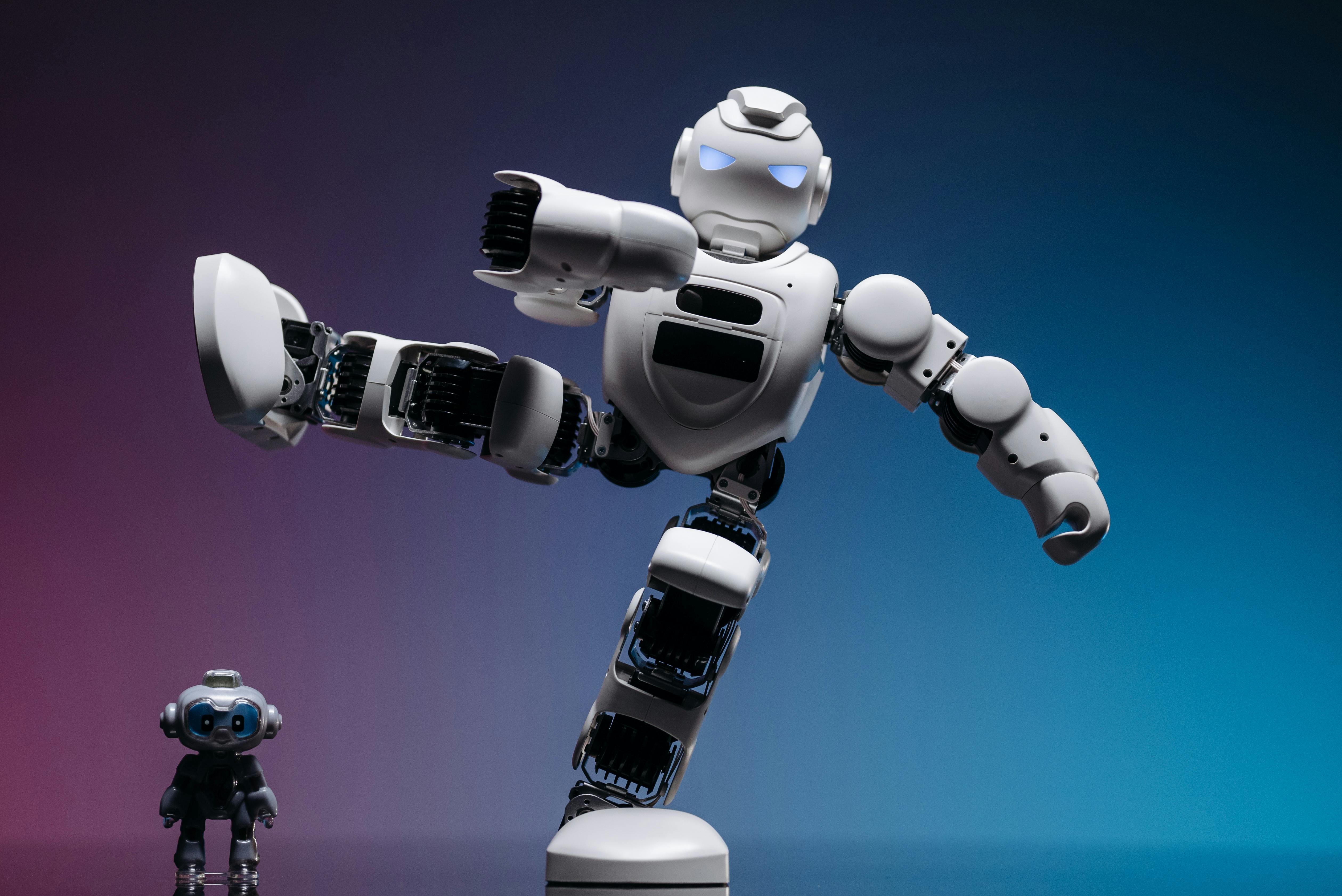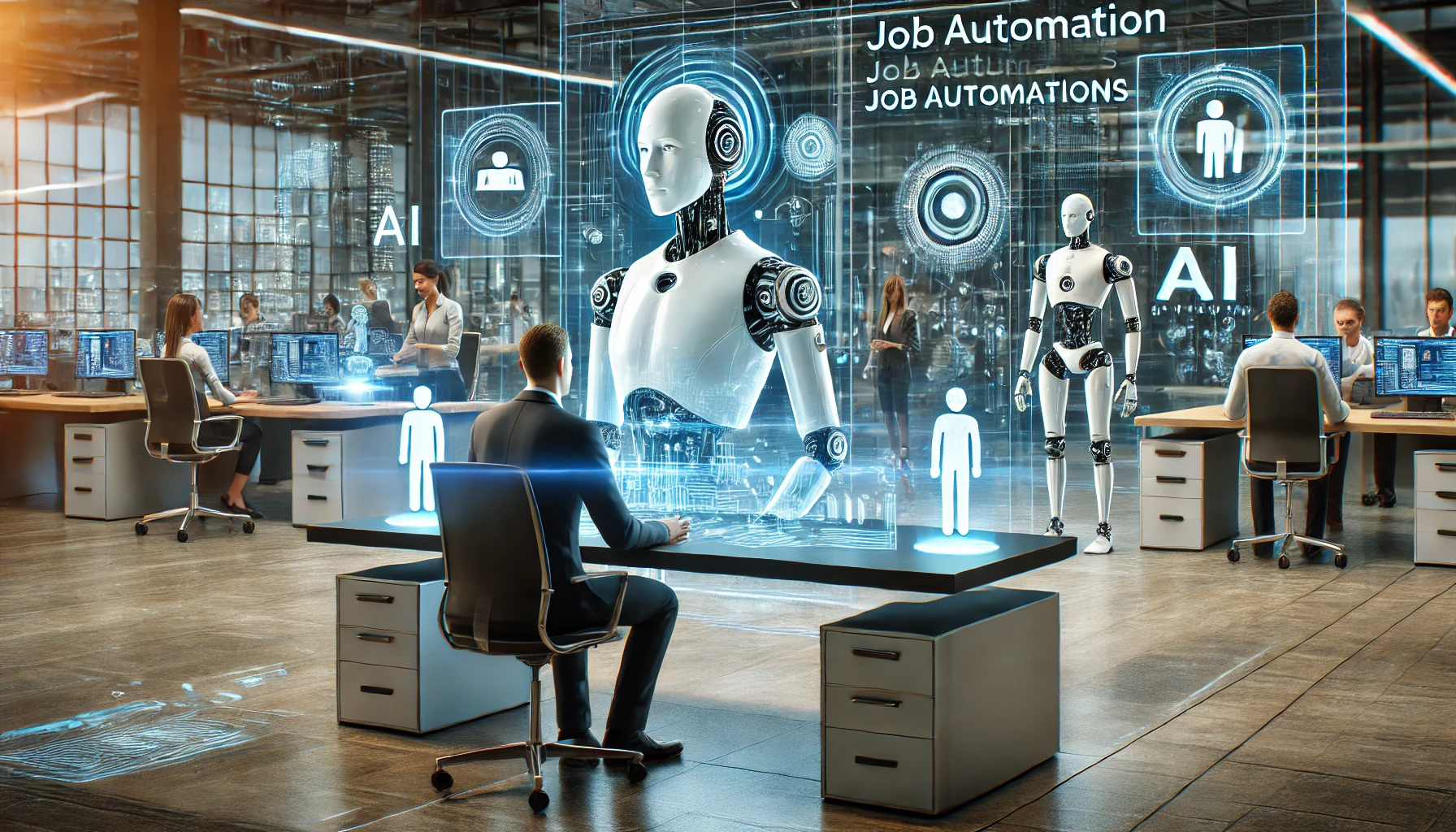Artificial Intelligence (AI) is reshaping the job market by automating tasks, creating new career opportunities, and changing skill requirements. While AI increases efficiency, it also raises concerns about job displacement and workforce adaptation. In this article, we will explore how AI is affecting employment and how professionals can prepare for the future of work.

1. The Impact of AI on Jobs
AI influences employment by:
- Automating repetitive tasks, reducing manual labor needs. AI systems can perform routine, predictable work with greater speed and accuracy than humans, from data entry and basic customer service to assembly line operations and quality control inspections.
- Creating demand for AI-related skills in data science and automation. The development, implementation, and maintenance of AI systems requires specialized expertise, driving growth in technical roles like machine learning engineering, data science, and AI operations.
- Reshaping industries like healthcare, finance, and marketing. AI is fundamentally changing how these sectors operate, automating diagnostic processes in healthcare, algorithmic trading in finance, and personalized customer targeting in marketing.
The integration of AI into the workforce represents a significant shift in how work is performed and organized. Unlike previous waves of automation that primarily affected physical tasks, AI is increasingly capable of performing cognitive tasks that were previously thought to require human intelligence.
Labor Market Analysis: According to the World Economic Forum’s Future of Jobs Report 2024, AI and automation are expected to transform 85 million jobs globally by 2030. While 97 million new roles may emerge from this shift, the transition will require significant reskilling efforts and may disproportionately impact workers without post-secondary education.
2. Jobs at Risk Due to AI Automation
A. Customer Service and Administrative Roles
AI-powered chatbots are replacing human customer support representatives. Natural language processing has advanced to the point where virtual agents can handle complex customer inquiries, process complaints, and even detect emotional cues in text and voice interactions. Many companies now resolve over 70% of customer service inquiries without human intervention.
Virtual assistants automate data entry and scheduling tasks. AI systems can extract information from emails and documents, schedule meetings, maintain calendars, and process routine paperwork that once required dedicated administrative staff. These systems can work 24/7 without breaks and with minimal errors.
“The administrative profession isn’t disappearing, but it’s evolving dramatically. Today’s executive assistants spend less time on scheduling and data entry and more time on complex coordination, communication management, and strategic support. Professionals who can leverage AI tools rather than compete with them are thriving in this new environment.”
— Maria Rodriguez, Director of Workplace Transformation at Global Consulting Group

B. Manufacturing and Logistics
AI-driven robots are increasing efficiency in factories. Modern manufacturing facilities employ sophisticated robots guided by computer vision and machine learning to perform precision assembly, quality inspection, and materials handling. These systems can work in hazardous conditions and maintain consistent performance without fatigue.
Self-driving vehicles may replace human delivery drivers. Autonomous transportation technology is advancing rapidly, with self-driving trucks already operating on specific routes in several countries. As regulatory frameworks evolve, the logistics industry is preparing for significant shifts in how goods are transported and delivered.
Manufacturing economist Dr. James Chen explains: “The transformation of manufacturing through AI and robotics is following a predictable pattern: first automating dangerous and ergonomically challenging tasks, then moving to routine and repetitive processes, and finally integrating intelligent systems that can adapt to variations and make decisions. What’s interesting is that we’re seeing increased productivity in facilities that combine human workers with collaborative robots rather than those attempting full automation.”
C. Data Processing and Analysis
AI automates accounting, legal research, and financial analysis. Machine learning systems can now process invoices, identify tax deductions, review legal documents, and analyze financial trends with speed and accuracy that surpasses human capabilities. These systems can evaluate thousands of documents or data points simultaneously, identifying patterns and anomalies that might go unnoticed by human professionals.
Professional Impact: A 2024 study published in the Harvard Business Review found that large accounting firms have reduced entry-level hiring by 37% over the past five years, while increasing recruitment for roles involving AI implementation, client advisory services, and data science. Similar trends are emerging in legal services, where routine document review that once occupied junior associates is increasingly performed by AI systems.
3. Jobs Created by AI and Emerging Opportunities
While AI is displacing certain roles, it’s also creating entirely new career paths and transforming existing professions:
A. AI Development and Data Science
Machine learning engineers design AI models. These specialists develop the algorithms and neural networks that power AI applications, requiring expertise in programming, statistics, and domain-specific knowledge. The role combines technical skill with creative problem-solving to build systems that can learn from data and improve over time.
Data analysts interpret AI-generated insights. As organizations collect more data and deploy more AI systems, professionals who can translate technical outputs into actionable business strategies are increasingly valuable. These roles require a blend of analytical thinking, domain expertise, and communication skills.
B. AI in Healthcare and Cybersecurity
AI-assisted healthcare professionals improve diagnosis accuracy. Medical specialists working with AI diagnostic tools can detect conditions earlier and with greater precision than either humans or AI working alone. New roles are emerging for technicians who specialize in operating medical AI systems and interpreting their results.
AI-driven cybersecurity experts prevent digital threats. As cyber attacks become more sophisticated, security professionals are deploying AI systems to detect unusual patterns and potential vulnerabilities. This has created demand for specialists who understand both cybersecurity principles and machine learning techniques.

C. Creative and Ethical AI Roles
AI content creators enhance marketing strategies. A new generation of creative professionals is emerging who specialize in prompt engineering, AI-assisted design, and human-AI collaborative content production. These roles combine artistic vision with technical understanding of AI capabilities and limitations.
AI ethicists ensure fairness and accountability in AI development. As AI systems make more consequential decisions in areas like hiring, lending, and healthcare, organizations need specialists who can evaluate algorithms for bias, ensure compliance with regulations, and develop ethical frameworks for AI deployment.
Emerging Career: AI ethics has become one of the fastest-growing specializations in technology policy and governance. Major universities now offer dedicated graduate programs in AI ethics and governance, and leading technology companies have expanded their AI ethics teams significantly since 2023, with starting salaries for AI ethics specialists with advanced degrees averaging 15% higher than other technology policy roles.
4. How to Adapt to the AI Job Market
Professionals looking to thrive in an AI-transformed economy should consider these strategies:
- Develop AI-related skills, such as coding and data analysis. Familiarity with programming languages like Python, understanding of basic statistical concepts, and knowledge of how to work with data are becoming valuable across industries. Even non-technical roles increasingly benefit from understanding AI capabilities and limitations.
- Embrace lifelong learning to stay competitive in an AI-driven workforce. The rapid pace of technological change means that skills acquired during formal education may become outdated quickly. Successful professionals commit to continuous learning through online courses, certifications, industry conferences, and workplace training programs.
- Focus on human-centric skills, like creativity and problem-solving, that AI cannot easily replace. Emotional intelligence, ethical reasoning, creative thinking, and complex communication remain distinctly human capabilities. Developing these skills creates career resilience regardless of technological change.
“The most successful approach to AI isn’t trying to compete with it, but learning to collaborate with it. The professionals who are thriving are those who understand what AI tools can do well, what they can’t do well, and how to integrate these tools into their workflow to amplify their distinctly human capabilities.”
— Dr. Sarah Williams, Professor of Workforce Development at Stanford University
Career counselor Thomas Garcia adds: “I’m seeing a clear divide between professionals who approach AI with fear versus those who approach it with curiosity. Those who experiment with AI tools, even in small ways, develop an intuitive understanding of how these systems can enhance their work. This hands-on experience is often more valuable than theoretical knowledge about AI.”
5. The Future of AI in the Workforce
Looking ahead, several key trends will shape how AI continues to transform work:
- AI will enhance collaboration between humans and machines. Future workplaces will be designed around complementary capabilities, with AI handling routine, data-intensive tasks while humans focus on judgment, creativity, and interpersonal relationships. This human-AI teaming will be more sophisticated than today’s basic automation.
- New industries will emerge as AI continues to evolve. Just as the internet created entire economic sectors that didn’t previously exist, advanced AI will likely spawn new industries around synthetic content production, virtual experiences, augmented cognition, and AI governance.
- AI-driven education and training programs will prepare workers for future demands. Personalized, adaptive learning systems will make reskilling more accessible and effective, potentially reducing the disruption caused by technological change. These systems will provide just-in-time training tailored to individual learning styles and career paths.

Policy Perspective: The International Labour Organization’s 2024 report on “AI and the Future of Decent Work” emphasizes the need for policy frameworks that support worker transition, ensure equitable access to AI-related opportunities, and extend social protection systems to address potential disruption. Countries with robust worker retraining programs and flexible labor market policies are demonstrating greater resilience to AI-driven disruption.
Conclusion
AI is transforming the job market by automating tasks and creating new career opportunities. To stay relevant, professionals must adapt by learning new skills and embracing AI as a tool for growth.
The evolution of work in the age of artificial intelligence presents both challenges and opportunities. While certain roles will inevitably be automated, history suggests that technological revolutions ultimately create more jobs than they eliminate—though not necessarily for the same people or in the same locations. The most important factor in determining individual outcomes will be the capacity to adapt, learn continuously, and recognize that AI is a tool to be wielded rather than a competitor to be feared.
The future of work will be shaped by those who leverage AI to enhance their capabilities.
References and Further Reading
- World Economic Forum. (2024). The Future of Jobs Report 2024. WEF Global Economic and Social Policy Division.
- Rodriguez, M., & Johnson, T. (2024). Administrative Professional Evolution in the AI Era. Harvard Business Review, 102(4), 78-86.
- Chen, J., & Lee, K. (2023). Manufacturing Productivity and Human-Robot Collaboration. Journal of Manufacturing Technology Management, 34(3), 289-305.
- Harvard Business Review. (2024). Professional Services Transformation: AI Impact on Accounting and Legal Professions. HBR Research Report 2024-06.
- American Medical Association. (2024). AI in Clinical Practice: Current Applications and Future Directions. AMA Healthcare Innovation Series.
- National Institute of Standards and Technology. (2024). AI-Enhanced Cybersecurity: Capabilities and Implementation Frameworks. NIST Special Publication 800-203.
- Williams, S., & Garcia, T. (2024). Adaptive Career Strategies in an AI-Driven Economy. Stanford Social Innovation Review, Spring 2024, 42-49.
- International Labour Organization. (2024). AI and the Future of Decent Work: Policy Frameworks for an Inclusive Transition. ILO Employment Policy Department.

